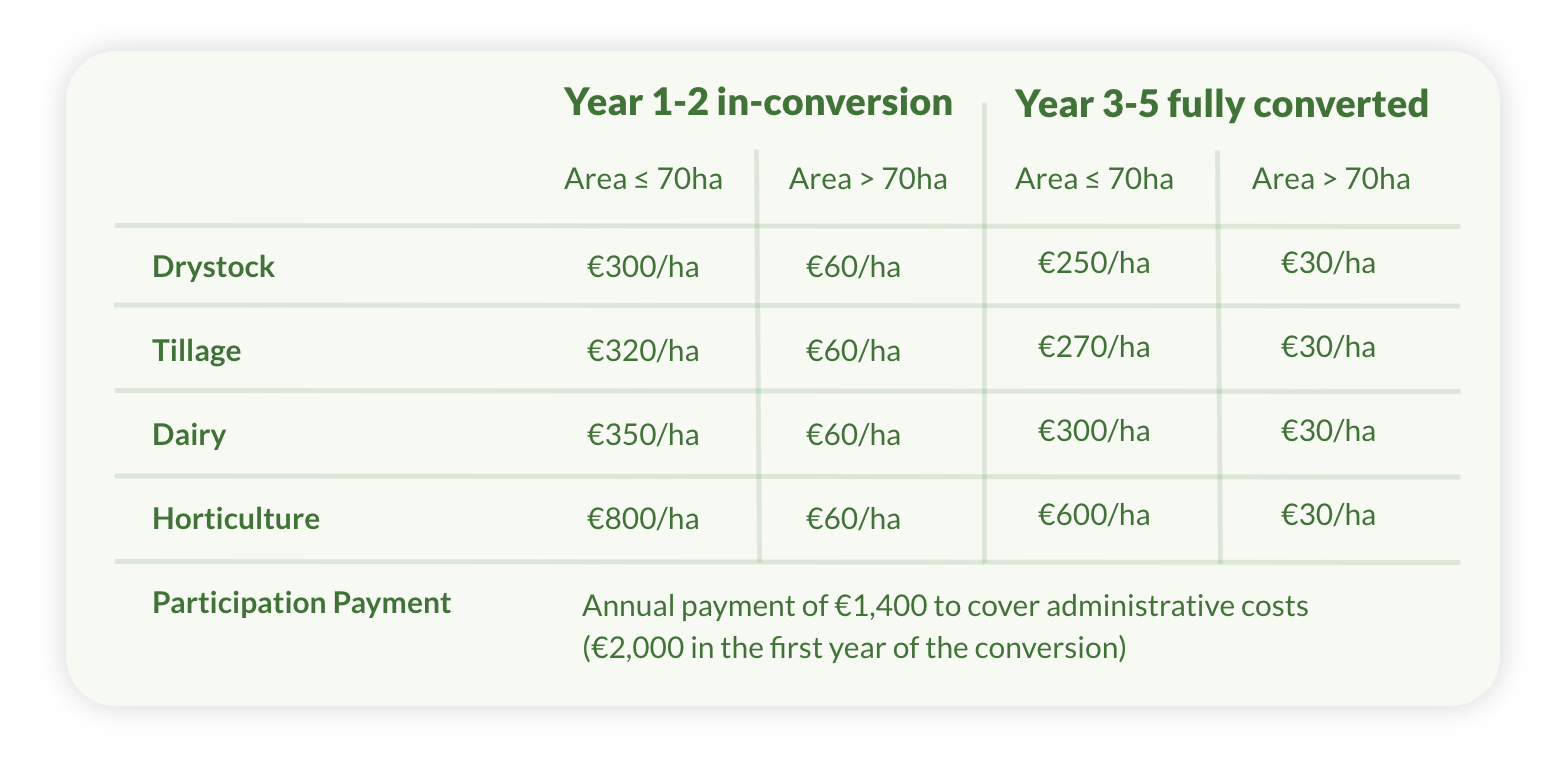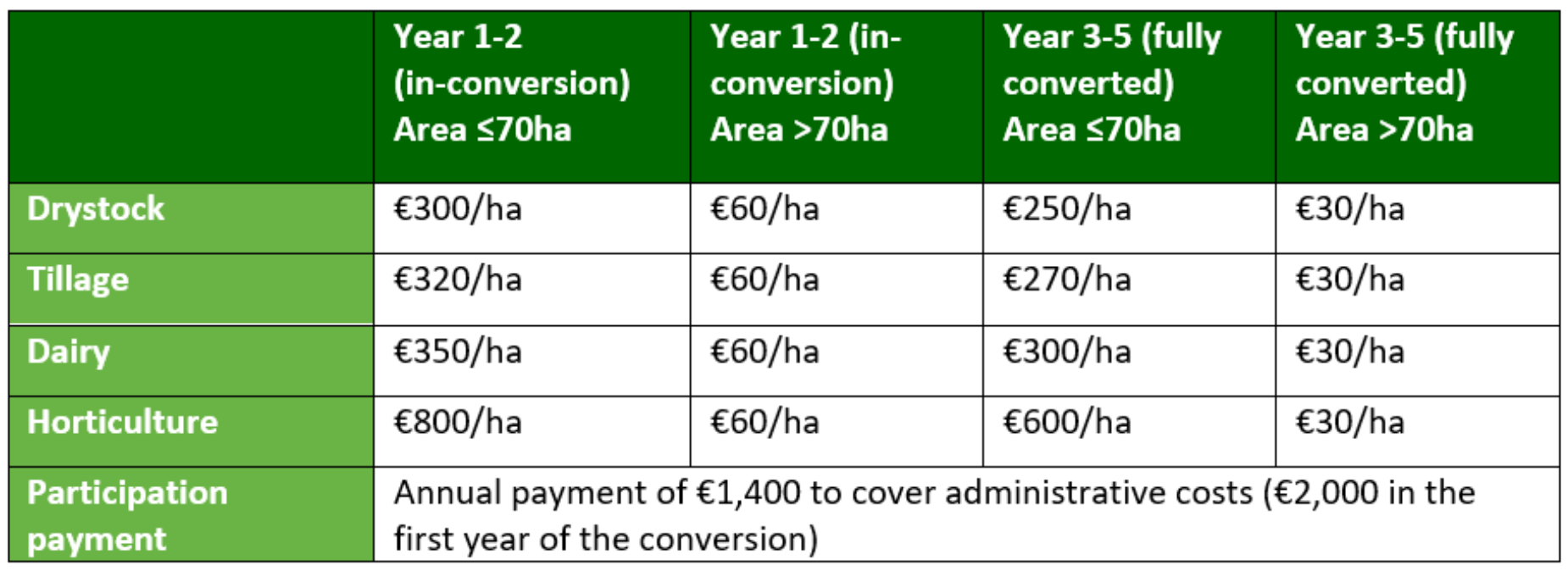Farming/Scheme and Grant Aid
Organic Farming Scheme
The Organic Farming Scheme is operated by the Department of Agriculture, Food and the Marine and funded through the CAP 2023-2027. The 5-year scheme is designed to financially support organic farmers. Grant aid for farm infrastructure and equipment is also available for different organic farming enterprises under the Organic Capital Investment Scheme.
Interested In Converting?
Understand what you need to know about the Organic Farming Scheme (OFS) and Organic Capital Investment Scheme (OCIS) as well as the different steps in the conversion process by reading our straight-forward information and guidance.
Remember you can contact the Irish Organic Association today by telephone 090 643 3680 or email info@irishoa.ie to discuss any questions you may have about your prospective application that you can’t find here.
Applications for Organic Farming Scheme are open in Tranches, set by the Department of Agriculture, Food and the Marine. Potential new entrants, however, can join the Irish Organic Association and convert their farm to organic at any time.
You can also apply to the Irish Organic Association by downloading and completing the application forms and sending them to us by email info@irishoa.ie or by post.
Organic Farming Scheme Payment Rates

The Organic Farming Scheme supports farmers with per hectare payments as well as a participation payment to cover additional administrative costs annually (see table above). If you wish to learn more about the potential payments for your farm you can use the Department’s Organic Payments Calculator.
All organic farmers and growers who are certified organic can avail of a Participation Payment under the Organic Farming Scheme. This is an annual payment of €2,000 for the first year of conversion and €1,400 thereafter for organic licence holders to cover administration and training costs etc.
Additional information on the Organic Farming Scheme can be found on the DAFM website.
How to Apply?
Step
Complete our Application Form and Conversion Plan to register with the Irish Organic Association (IOA)
Step
Fill out the first page of the ORG1 fom and include it in your IOA Application
Step
Register for the Department’s Organic Farming Scheme via Agfood.ie (following IOA notification)
An organic farmland conversion typically take 2 years from the day you start. Once completed you will be awarded full symbol statusand can market your products as organic.
Forms & Guidance
Once these forms are submitted to the Irish Organic Association you can apply for the Organic Farming Scheme via Agfood.ie.
Grant Aid for Organic Farm Infrastructure
The Organic Capital Investment Scheme part of the Targeted Agricultural Modernisation Scheme 3 (TAMS 3) provides grant aid of up to 60% for organic farmers participating in the Organic Farming Scheme. It supports cost towards farm buildings as well as specialised equipment and machinery.
Other licensed organic operators (not participating in the Organic Farming Scheme) are supported at a rate of 40%. The minimum amount of investment eligible is €2,000 per application, with a maximum investment ceiling per holding of €90,000, increasing to €160,000 for Farm Partnerships registered with the Department. Other TAMS 3 supports are also available to organic farmers, subject to eligibility.
Further information on the Organic Capital Investment Scheme can be found on the DAFM website.
Are you a small producer or new entrant to farming?
Farmers and growers who have not previously participated in the Organic Farming Scheme will need to:
- Register with DAFM/Regional Veterinary Office to get a herd number when applying. (This is necessary even if you do not have livestock as it currently acts as an identification number), and;
- Complete a Basic Income Support Scheme (BISS) on-line application via the Agfood.ie portal.
Please note that growers under 1 hectare can also apply for the Scheme if they can prove that they have a commercial business.
Frequently Asked Questions
In this section you will find information on the most commonly asked questions about converting to organic farming.
Organic Farming (General)
Organic Farming Scheme
 All farmers (in-conversion or fully converted) who are part of the Organic Farming Scheme avail of the above payment rates. You can learn about the potential payments for your farm using the Department’s Organic Payments Calculator
All farmers (in-conversion or fully converted) who are part of the Organic Farming Scheme avail of the above payment rates. You can learn about the potential payments for your farm using the Department’s Organic Payments Calculator - Complete our Application Form and Conversion Plan
- Fill out the first page of the ORG1 form and include it in your IOA application
- Register your Organic Farming Scheme application with the Department via Agfood.ie*
More Specific Questions or Queries
You will find further information about converting to organic farming in different sectors on our dedicated Frequently Asked Questions section.
Organic Production Principles Course
As part of the Organic Farming Scheme, participants must also complete a 25-hour Organic Production Principles Course within a certain period. The course is offered by various providers around the country, including Teagasc and the National Organic Training Skillnet (NOTS)
Other Grant Schemes
Organic farmers can also take advantage of other schemes and supports offered by the Department including priority access to ACRES – the Agri-Climate Rural Environment Scheme